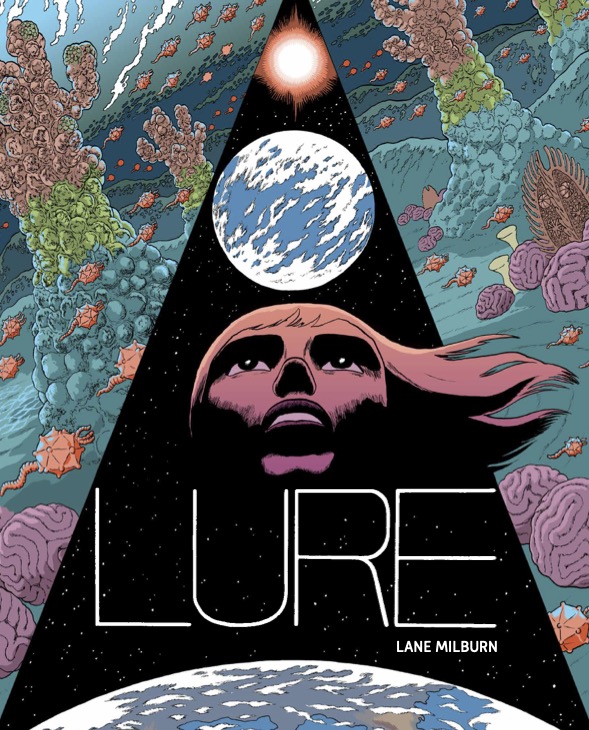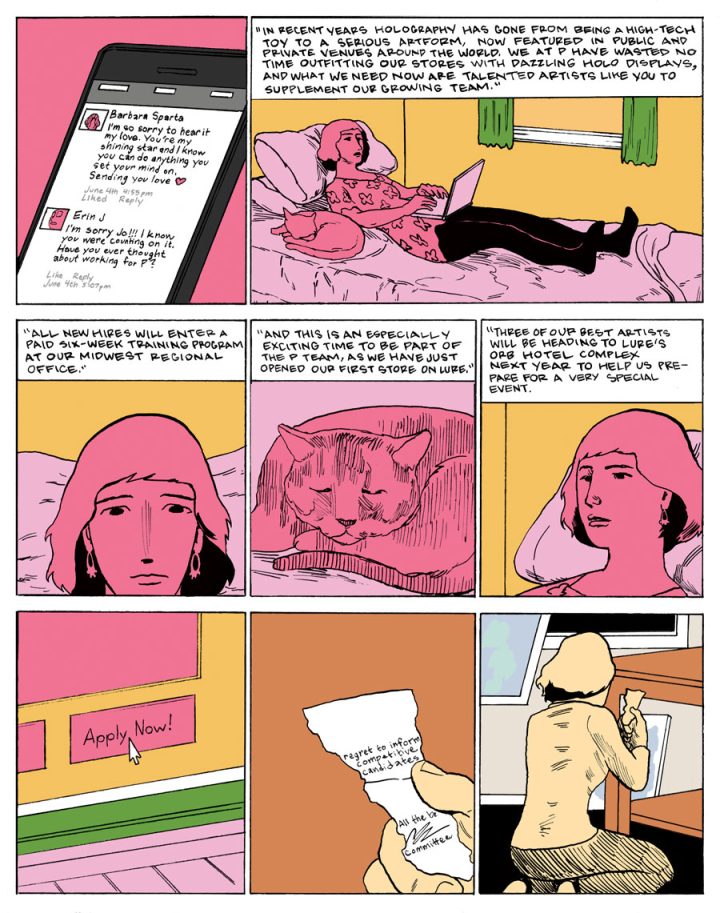The history of comics is drenched in the history of the commodification of art and creativity. Whatever you define as the genesis of the comic book industry – unless you’re Scott McCloud and you include the Paleolithic cave paintings from Lascaux in your definition, but maybe even then – you’re going to have an impossible task trying to peel the art away from the commerce. Comics are art. Comics are products. The creative force is commercialized, compromised, commodified.
Lane Milburn’s Lure is not overtly about comics, nor is it about the history of comics, but it is deeply about the collision between art and commerce and the inevitable destruction that follows the fission between the two. Everything is doomed, but Milburn provides beauty and optimism and splendor and humanity and mystery along the way. This is a comic that engages with life.
The Lure of the title, in its literal form, is a celestial body in orbit around the Earth, a paradise in place of the moon, a luxury island in space, aquatic, alien, and unknown, colonized by commercial interests. The protagonist, Jo Sparta, is lured to Lure by the promise of a fresh start in a beautiful place where she will be one of the chosen few to enjoy this off-planet oasis. She earned her place on Lure as holographic artist, one of the few selected for a special project to launch a new venture on this exotic world. Essentially, she’s working abroad for a time, only instead of a foreign land it’s a foreign world, and what she finds is that the commercialized space resort isn’t much different than what she left at home.
I am only vaguely familiar with Lane Milburn’s previous work. I have seen excerpts from Milburn’s Twelve Gems (which looks like something I would enjoy so I don’t know what has held me back from reading it) and his comics serialized on Vice.com seem also to feature a character named Jo Sparta who may or may not be the same character featured in Lure. I don’t know any of that, and after reading this book, I am curious enough to go back to those serialized comics and look for intersections, but there’s no prior knowledge needed to get a complete story out of Lure. It stands alone as a narrative about wanting something more from the unknown and the terror of confronting the reality that there isn’t as much more as you would have hoped.
Milburn’s visual storytelling, and particularly his musical use of color, captures the quotidian and the exotic in equal measures. It’s a science fiction graphic novel that trucks in office politics and mundane living conditions while allowing moments of wondrous spectacle like a space goddess flying across volcanic landscapes and harmonious gardens cultivated from the flora of an alien world.
“People talk about going to sleep and waking up out there, and then going back to sleep and waking up back here,” Jo says to a group of friends at a bleak chain restaurant before she departs for Lure. “Maybe they’re not going anywhere at all,” she adds. The story doesn’t exactly have a dream-like quality to it, but there are some atonal notes, bizarre disconnections, and repetitions that give the graphic novel, at times, the feel of a slow motion nightmare. You know that feeling you get in a nightmare when you are trapped and you scream and no one can hear you? That’s what Jo’s life feel like, on Earth and on Lure, when her only moments of agency are undermined by forced beyond her control. It’s the gasp of an artist losing her soul, no matter how hard she tries to retain it.
There’s a sense of foreboding throughout Lure. It starts with ennui and a series of small defeats – Jo’s holographic artwork deployed in service of a discount bathroom fixture sale, the silence of the commute home on a cramped train, abandoned paintings left unfinished – and explicit warnings that humanity is in rough shape as the climate crisis escalates. Even the application and acceptance to the Lure artist program, a new and potentially exciting opportunity for Jo, is never given a moment of exuberance or excitement. Jo either lacks the ability to feel joy or she’s a reflection of a society that has numbed itself to death, and her exotic excursion off-world feels like a trip to a half-dead shopping mall that has been overrun by a space version of Carnival Cruises with faux-glamour for the wealthy. The foreboding lingers as exotic mysteries are undermined by open mic nights on Lure and a creative director who, as usual, misses the point entirely. All the while a space goddess lurks on the edges, promising release and relief from the commercialism that has intruded even in paradise.
Even with all the foreboding and the existential dread contrasted with the beauty of an alien world commodified, Lure is never lifeless. Milburn imbues his characters with an inner flame, even though their life is barely flickering beneath the crush of corporate pursuits. Ultimately, Lure celebrates humanity and tries to tell a heroic story in a world – two worlds – drenched in bad taste and dehumanizing culture. It’s a beautiful, troubling work that’s filled with the impossible and the dangerously real.










